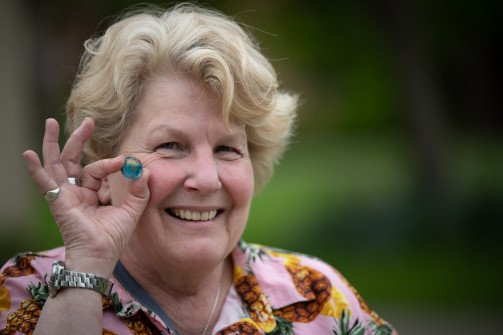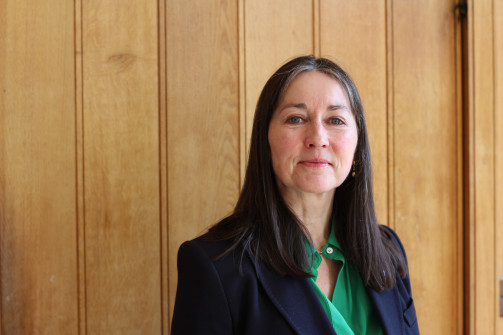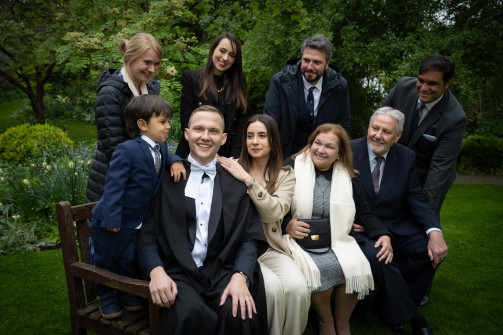"The highlight of the gardening year" as Wolfson's young Judas Tree flowers
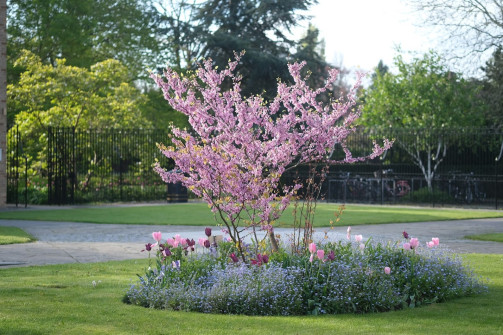
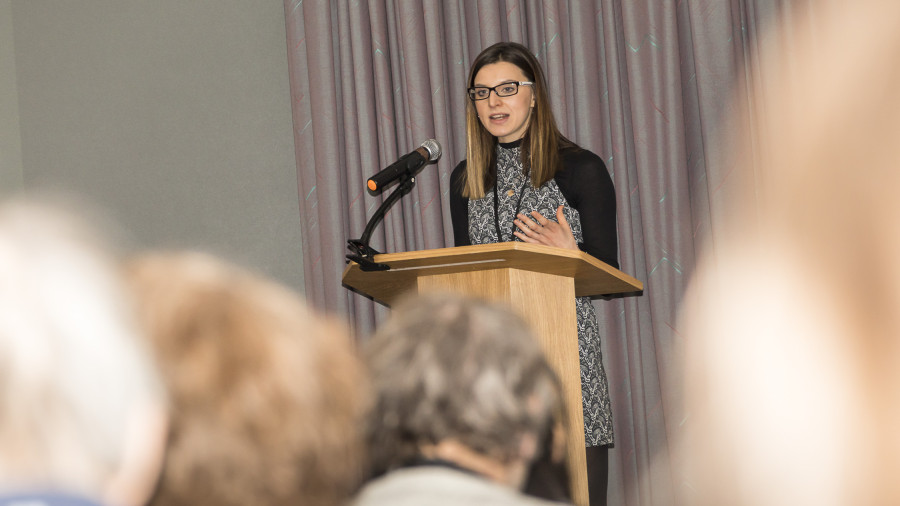

This statement sets out the College’s commitment to freedom of thought and expression, outlines the various legislative frameworks under which such freedoms must be upheld and may be circumscribed, and summarises the procedures used by the College to manage these issues. It endorses and is aligned with the University’s Statement on Freedom of Speech as approved on 9 December 2020.
Wolfson College, as a world-leading education and research institution, is fully committed to the principle, and to the promotion, of freedom of speech and expression. Chief among the College’s core values are ‘freedom of thought and expression’ and ‘freedom from discrimination’. The College fosters an environment in which all of its members and employees can participate fully in College life, and feel able to question and test received wisdom, and to express new ideas and controversial or unpopular opinions within the law, without fear of intolerance or discrimination. In exercising their right to freedom of expression, the College expects its members, employees and visitors to be tolerant of the differing opinions of others, in line with the College’s core value of freedom of expression. The College also expects its members, employees and visitors to be tolerant of the diverse identities of others, in line with the University’s core value of freedom from discrimination. While debate and discussion may be robust and challenging, all speakers have a right to be heard when exercising their right to free speech within the law.
The College will ensure that members and employees are able to exercise freedom of thought and expression within the law without placing themselves at risk of losing their job or any College privileges and benefits they have. The College expects all members and employees to engage with intellectual and ideological challenges in a constructive, questioning and peaceable way, even if they find the viewpoints expressed to be disagreeable, unwelcome or distasteful. The right of members and employees to freedom of assembly, and to protest against certain viewpoints, should not obstruct the ability of others to exercise their lawful freedom of expression.
These commitments are reinforced by the Human Rights Act 1998, which brings the European Convention on Human Rights into direct effect in national law. Article 10 of the Convention articulates freedom of expression as a human right and sets out the limited circumstances in which that right might be circumscribed (such as to protect public safety, for the prevention of disorder or crime, or for the protection of the reputation or rights of others). These commitments also exist within other UK legislation. Universities in England and Wales, notably, have a statutory duty under section 43 of the Education (No. 2) Act 1986 to take such steps as are reasonably practicable to ensure that lawful freedom of speech and expression is secured for all members and employees and for visiting speakers. As part of this statutory duty the College is also required to issue and keep up to date a code of practice to be followed by all members and employees of the College for the organisation of meetings and other events whether indoors or outdoors on College premises. The College accordingly has implemented a Code of Practice on Meetings and Public Gatherings on College Premises (‘the Code’). The Code also sets out the conduct required of all individuals involved in such meetings and events.
In addition, section 26 of the Counter-Terrorism and Security Act 2015 (see footnote 1) places a duty on certain bodies, including Higher Education Institutions, in the exercise of their functions to have ‘due regard to the need to prevent people from being drawn into terrorism’. This necessitates the establishment of protocols and procedures by which to assess the risks associated with meetings or events that are University hosted, affiliated, funded, or branded. This Act also requires Higher Education Institutions to have particular regard to other statutory duties with regard to academic freedom and freedom of expression. Debate, discussion, and critical enquiry are, in themselves, powerful tools in preventing people from being drawn into terrorism.
An active programme of speakers and other events is fundamental to the academic and other activities of the College. College members and employees are encouraged to invite a wide range of speakers and to engage critically but courteously with them. This Statement and the Code provide the only mechanism by which the College can cancel or impose conditions on meetings or events where this action is deemed necessary as a result of the event’s subject matter and/or speaker(s). This is to ensure that the use of College premises is not inappropriately denied to any individual or body of persons on any ground connected with their beliefs or views or the policy or objectives of a body (with the exception of proscribed groups or organisations) of which they are a member.
The College’s policy, in line with its duty under section 43 of the Education (No. 2) Act 1986, is that any speaker who has been invited to speak at a meeting or other event, on College premises, must not be stopped from doing so unless: they are likely to express unlawful speech, or their attendance would lead the host organisation to breach other legal obligations, and no reasonably practicable steps can be taken to reduce these risks. However, all speakers should anticipate that their views might be subject to robust debate, critique and challenge.
External speakers who are known to be members of proscribed groups or organisations, or who are likely to encourage support for proscribed groups or organisations under UK law (see footnote 2), should not be invited to speak at College events. The College will not unreasonably either refuse to allow events to be held on its premises or impose special or unreasonable or onerous conditions upon the running of those events. The lawful expression of controversial or unpopular views will not in itself constitute reasonable grounds for withholding permission for a meeting or event.
The College may only restrict speaker events given a reasonable belief that such events are likely to involve speech that violates the law, that falsely defames a specific individual, that constitutes a genuine threat or harassment, that unjustifiably invades substantial privacy or confidentiality interests, or that is otherwise directly incompatible with the functioning of the College. In addition, the College may reasonably regulate speaker events to ensure that they do not disrupt the ordinary activities of the College.
These narrow exceptions to the general principle of freedom of expression are not intended ever to apply in a way that is inconsistent with the College’s commitment to the completely free and open discussion of ideas.
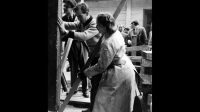
How did architecture schools respond to the need to rebuild Britain after World War Two?
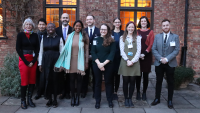
An opportunity for the Wolfson community to discover and engage with the diverse and important sustainability research happening across College by its Fellows and Early Career Researchers.
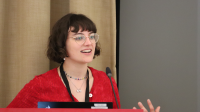
Join Wolfson postgraduate students as they talk about their research in an informal evening of interesting presentations and friendly discussion – complete with wine and cheese!
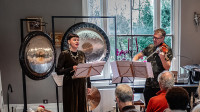
The Alexandra Ensemble performs a programme of music by British composers for soprano and violin.

A display of works from the Bradshaw-Bubier studio pottery collection.

